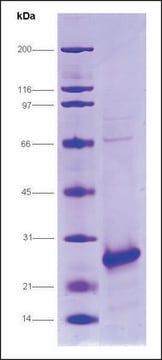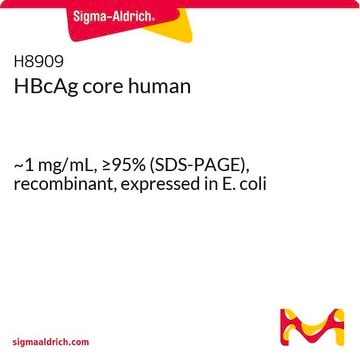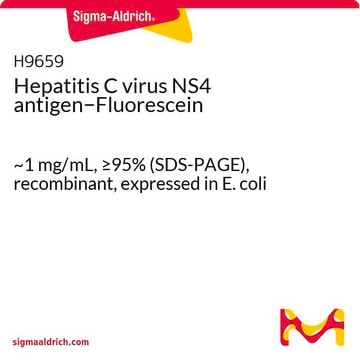H9034
Hepatitis C virus core antigen
~1 mg/mL, ≥95% (SDS-PAGE), recombinant, expressed in E. coli
Sign Into View Organizational & Contract Pricing
All Photos(1)
About This Item
Recommended Products
recombinant
expressed in E. coli
Quality Level
Assay
≥95% (SDS-PAGE)
mol wt
22 kDa (plus 114 kDa galactosidse)
concentration
~1 mg/mL
shipped in
dry ice
storage temp.
−20°C
Gene Information
hepatitis C virus ... HCVgp1(951475)
human ... HBVgp4(944568)
General description
Hepatitis C virus core antigen (HCV-cAg) is a well-preserved antigenic protein of the internal capsid.
Hepatitis C virus glycoprotein 1 (HCVgp1), also referred to as polyprotein, is crucial for the induction of double-membrane vesicles, sites of HCV RNA amplification. The amino terminal of polyprotein contains the structural proteins core, envelope protein 1 (E1) and E2. The proteolytic cleavage of polyprotein results in the formation of 10 mature viral proteins which are needed for viral replication and assembly.
amino acids 2-192 of HCV polyprotein
Specificity
Reacts strongly with human HCV positive serum.
Application
Hepatitis core antigen (HCA) has been used as an analyte in enzyme-linked immunosorbent assay (ELISA) to study the mechanism of bovine serum albumin (BSA) blocking in common ELISA protocols.
Biochem/physiol Actions
Hepatitis C virus core antigen (HCV-cAg) may be a less expensive way to diagnose active hepatitis C virus (HCV) infection in the hemodialysis (HD) population.
Positive control for HCV antibodies.
Other Notes
HCV core antigen [2-192]-Galactosidase-tagged at the N-terminus.
Physical form
Solution in 8 M Urea, 20 mM Tris-HCl, pH 8.0, 10 mM 2-mercaptoethanol.
Storage Class Code
10 - Combustible liquids
WGK
WGK 2
Flash Point(F)
Not applicable
Flash Point(C)
Not applicable
Choose from one of the most recent versions:
Already Own This Product?
Find documentation for the products that you have recently purchased in the Document Library.
Alejandra Pérez-García et al.
International journal of infectious diseases : IJID : official publication of the International Society for Infectious Diseases, 89, 131-136 (2019-10-04)
New efficient strategies are needed for the assessment of active hepatitis C virus (HCV) infection. The aim of this study was to evaluate the ability of HCV core antigen (HCV-cAg) as a marker of active HCV infection in newly diagnosed
Xue Zheng Wong et al.
BMC nephrology, 21(1), 480-480 (2020-11-15)
Hepatitis C virus (HCV) infects more than 71 million people worldwide and chronic HCV infection increases the risk of liver cirrhosis and failure. Haemodialysis (HD) is one of the renal replacement therapies with risk of HCV transmission. Anti-HCV antibodies are
BSA blocking in enzyme-linked immunosorbent assays is a non-mandatory step: a perspective study on mechanism of BSA blocking in common ELISA protocols
Ahirwar R, et al.
Royal Society of Chemistry Advances, 5(121), 100077-100083 (2015)
Inés Romero-Brey et al.
mBio, 6(4), e00759-e00759 (2015-07-15)
Induction of membrane rearrangements in the cytoplasm of infected cells is a hallmark of positive-strand RNA viruses. These altered membranes serve as scaffolds for the assembly of viral replication factories (RFs). We have recently shown that hepatitis C virus (HCV)
Margaret A Scull et al.
PLoS pathogens, 11(11), e1005297-e1005297 (2015-11-21)
The hepatitis C virus (HCV) p7 protein is required for infectious virus production via its role in assembly and ion channel activity. Although NMR structures of p7 have been reported, the location of secondary structural elements and orientation of the
Our team of scientists has experience in all areas of research including Life Science, Material Science, Chemical Synthesis, Chromatography, Analytical and many others.
Contact Technical Service![Guanosine 5′-[β,γ-imido]triphosphate trisodium salt hydrate ≥85% (HPLC), powder](/deepweb/assets/sigmaaldrich/product/structures/204/494/05808804-1ca7-44bf-b6c5-d4934dc7cb85/640/05808804-1ca7-44bf-b6c5-d4934dc7cb85.png)



![Guanosine 5′-[γ-thio]triphosphate tetralithium salt ≥90% (contains < 10% GDP, HPLC), powder](/deepweb/assets/sigmaaldrich/product/structures/131/514/e3025b6a-cb52-4818-b20f-98efac485c1a/640/e3025b6a-cb52-4818-b20f-98efac485c1a.png)


